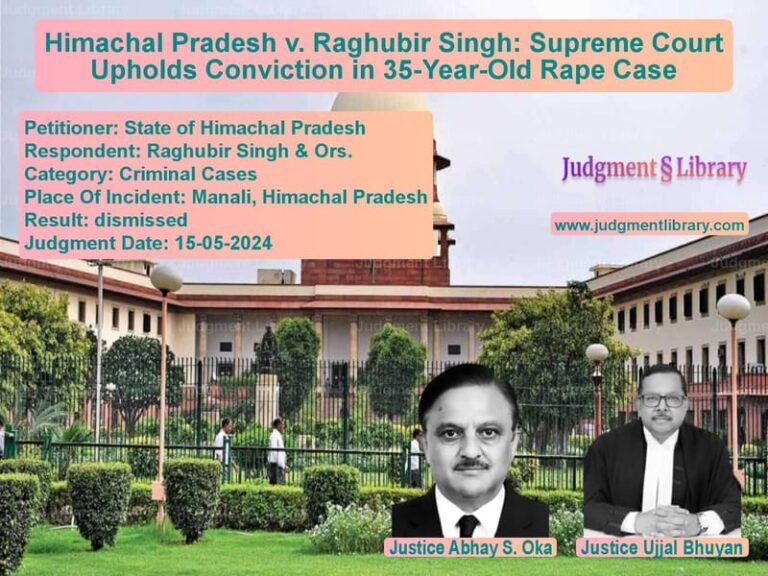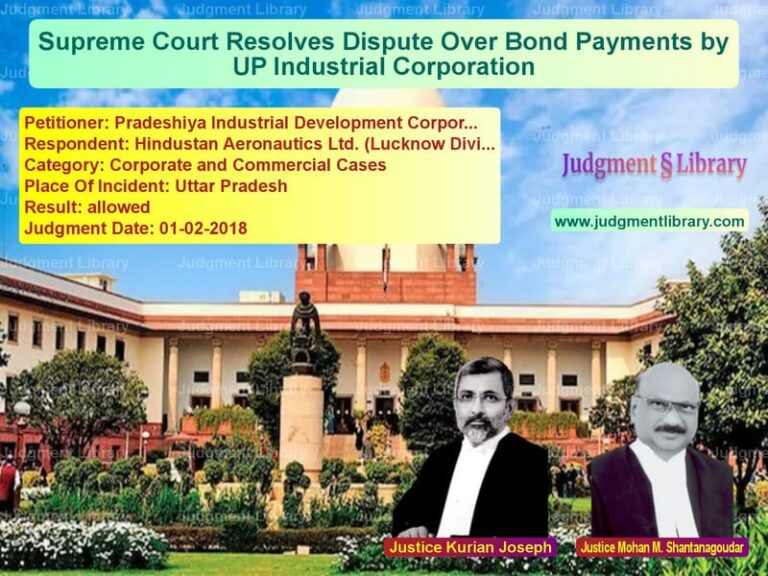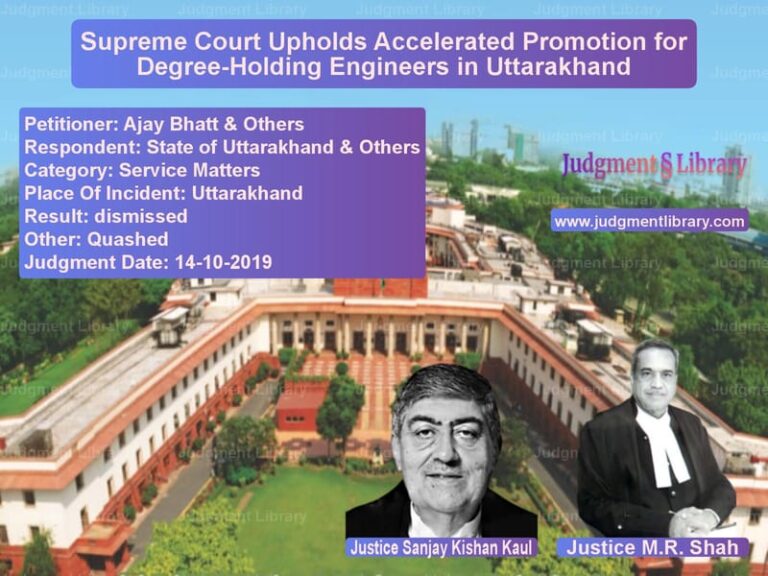Supreme Court Acquits Man Convicted Under NDPS Act Due to Procedural Lapses
The case of Nababuddin @ Mallu @ Abhimanyu v. State of Haryana deals with a significant ruling by the Supreme Court concerning convictions under the Narcotic Drugs and Psychotropic Substances Act, 1985 (NDPS Act). The Court examined whether procedural lapses in the investigation and trial process warranted an acquittal. The judgment sheds light on the importance of following due process when prosecuting individuals under the NDPS Act.
Background of the Case
The appellant, Nababuddin @ Mallu @ Abhimanyu, along with two co-accused, was convicted under Section 15 of the NDPS Act. The prosecution alleged that they were found in conscious possession of 205 kilograms of poppy straw without any valid license or permit.
Read also: https://judgmentlibrary.com/supreme-court-upholds-life-imprisonment-in-accidental-killing-case/
The Special Judge sentenced all three accused to:
- Rigorous imprisonment for ten years
- A fine of ₹1,00,000
- In default of payment, additional imprisonment of two years
The Punjab and Haryana High Court upheld their conviction and sentence, leading the appellant to approach the Supreme Court.
Prosecution’s Case
According to the prosecution:
- On May 22, 2001, Assistant Sub-Inspector Dhian Singh (PW-10) and his team were on patrol duty in Ambala Cantonment when they received a secret tip-off regarding the presence of contraband parcels at Ambala Railway Station.
- Upon verification, five parcels were opened, revealing a total of ten bags containing 205 kilograms of poppy straw.
- Formal procedures such as panchnama preparation, sample collection, and sealing were completed.
- On May 28, 2001, Inspector Ram Phal (PW-11) and Dhian Singh (PW-10) visited Kurail Railway Station (the destination of the parcels) to track down the recipient.
- Accused Rahish alias Munna approached the railway station supervisor with a railway receipt and was arrested.
- Shortly after, the appellant, Nababuddin, also arrived at the station and enquired about the same parcels.
- The police considered both accused to be in conscious possession of the contraband and arrested them.
Appellant’s Defense
The appellant contended:
- He was a rickshaw puller and had no knowledge of the parcels.
- He had gone to the railway station only to check on Rahish when he did not return after 15 minutes.
- He did not possess or produce the railway receipt related to the parcels.
- The prosecution failed to prove his conscious possession of the contraband.
Supreme Court’s Observations
1. No Direct Evidence of Possession
The Court found that the prosecution’s case rested primarily on circumstantial evidence:
- The railway receipt was produced by accused no. 2, Rahish, not the appellant.
- None of the prosecution witnesses testified that the appellant handled the receipt.
- The appellant’s presence at the railway station, without additional incriminating evidence, was not enough to establish conscious possession.
2. Failure to Follow Due Process Under Section 313 CrPC
The Supreme Court noted a serious procedural lapse:
- The trial court failed to properly question the appellant under Section 313 of the Criminal Procedure Code (CrPC).
- Crucial facts, such as the railway receipt being in his name, were not put to him during his examination.
- The Court cited Raj Kumar v. State (NCT of Delhi), which held that non-disclosure of key circumstances to the accused violates the right to a fair trial.
3. Inconsistent Testimonies of Witnesses
The prosecution witnesses provided conflicting statements:
- PW-2 (Station Superintendent) stated that accused no. 2 presented the railway receipt, not the appellant.
- PW-10 (Investigating Officer) initially claimed the appellant was involved but later admitted that the key document was presented by another accused.
The Court ruled that such inconsistencies created reasonable doubt regarding the appellant’s involvement.
Final Judgment
The Supreme Court ruled:
- The procedural lapse in Section 313 CrPC examination was a serious irregularity.
- The appellant’s mere presence at the railway station was not sufficient to establish possession.
- Given that he had already served five and a half years in prison, subjecting him to a fresh trial would be unfair.
Accordingly, the Supreme Court acquitted the appellant and set aside his conviction. The bail bonds were cancelled.
Key Takeaways
1. Conscious Possession Must Be Proven
Under the NDPS Act, mere physical proximity to contraband is insufficient to establish guilt. There must be evidence proving the accused had control and knowledge of the illegal substance.
2. Proper Section 313 CrPC Examination is Crucial
If key facts are not put to the accused during trial, the conviction cannot be sustained.
3. Fair Trial Rights Must Be Upheld
The judgment underscores the Supreme Court’s commitment to ensuring procedural fairness and protecting the rights of the accused.
Conclusion
This ruling serves as an important precedent in cases under the NDPS Act. It highlights the need for procedural diligence in securing convictions and ensures that accused individuals are given a fair opportunity to defend themselves. The decision reinforces the principle that legal safeguards must be strictly followed to prevent wrongful convictions.
Read also: https://judgmentlibrary.com/juvenility-and-criminal-convictions-supreme-courts-landmark-judgment/
Petitioner Name: Nababuddin @ Mallu @ Abhimanyu.Respondent Name: State of Haryana.Judgment By: Justice Abhay S. Oka, Justice Pankaj Mithal.Place Of Incident: Ambala Cantonment, Haryana.Judgment Date: 23-11-2023.
Don’t miss out on the full details! Download the complete judgment in PDF format below and gain valuable insights instantly!
Download Judgment: nababuddin-@-mallu-@-vs-state-of-haryana-supreme-court-of-india-judgment-dated-23-11-2023.pdf
Directly Download Judgment: Directly download this Judgment
See all petitions in Drug Possession Cases
See all petitions in Bail and Anticipatory Bail
See all petitions in Judgment by Abhay S. Oka
See all petitions in Judgment by Pankaj Mithal
See all petitions in allowed
See all petitions in Quashed
See all petitions in supreme court of India judgments November 2023
See all petitions in 2023 judgments
See all posts in Criminal Cases Category
See all allowed petitions in Criminal Cases Category
See all Dismissed petitions in Criminal Cases Category
See all partially allowed petitions in Criminal Cases Category







